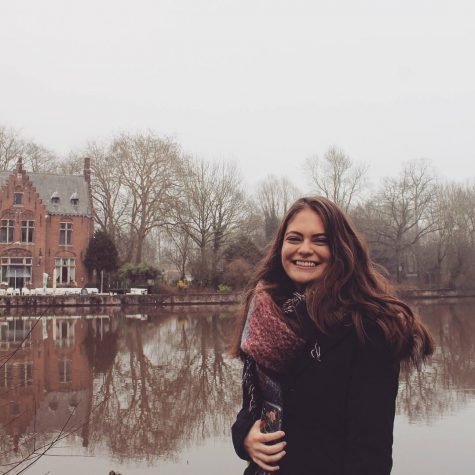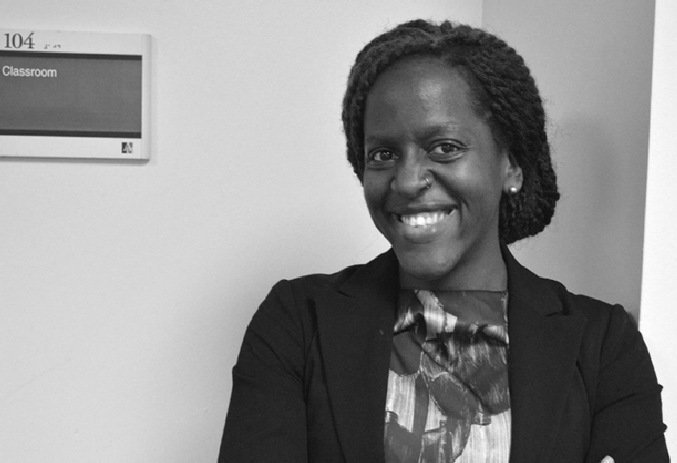Forces of Habit: Nathifa Greene
Nathifa Greene spends her days pondering the biggest questions of our time, tugging at the intersections of race, feminism and habit in her quest to understand the psychology of knowledge. A western philosophy professor at AU, Greene discusses Trinidad, strip malls and what makes us human.
Your biography states that you lived in Venezuela, Brazil and Trinidad, attending college in the United States and living in Belgium for your post-college years. Living in three nations in your childhood must have given you a global perspective and an awareness for other cultures that many children don’t have. Is that true? If so, how did that affect you?
I think that going to international schools growing up meant that I was lucky enough to be exposed to cultures from all around the world in an intimate way, like friends and family and going to birthday parties at different homes. I was really lucky in that way to have a sense of what regular people are like or what cultural traditions are like from actual contact with people, not just reading about it or watching it on TV. And I will say that in being from Trinidad, I’m also very fortunate because Trinidad is a very diverse and kind of “crossroads” island. We just celebrated Diwali, and we celebrate Eid every year. We have Afro, Indo, Syrian, Lebanese and Chinese cultures in a tiny island and that makes us very intimately acquainted with other countries.
Your research interests are feminism, philosophy of race and moral psychology. What led you to those interests?
I think the psychology of knowledge is really fascinating, so I’m always curious to try and figure out why people think the way that they do. And having become a philosopher, I’m very aware that the best argument doesn’t always persuade. So how can that be, even in the face of a well-reasoned argument, [that] people don’t necessarily go with the best, most thoughtful idea? Noticing that makes me interested in the psychology of knowledge. And the moral piece of moral psychology probably ties into the ethical questions that feminist theory and philosophy of race have at their core—questions about humanity and values and things that we take for granted.
I feel that those three subjects intersect. How so?
For me, in my research, they intersect because I think a lot about habit—habit or the habits that we develop—and how we can act habitually, almost automatically. That’s the main subject for my research right now. And so I think about the ways that our habits can compel us to act in certain ways. We have these epistemic or mental habits and cultural habits as well that get us to places without realizing it. And focusing on habit helps me to see or think about issues in different subjects at the same time, and I kind of like that because I like the interdisciplinary variety that I get.
Where has your past research taken you, whether that be a physical country or a state of understanding?
Most recently, my past research has taken me to think about music a lot. I think about how expertise in music is like a framework for our moral expertise. If we think about habit as “becoming good at something,” the way that we develop habits in music and the ability to do something else depends on a foundation of habit. I think a lot about musical expertise also in part because I’ve long wanted to play the piano, and I’m not very good at it. I think about people who can improvise really well. Improvisation is a skill that depends on a foundation of habit.
My research has also taken me physically to Long Island, which is where I got my Ph.D., and the suburbs. The American suburbs are an interesting place—they are strange. The strip mall after strip mall where all the Targets are the same—it’s very different. Plus the practices of American segregation make the landscape—the social landscape, the visual landscape—of American cities and suburbs very different. America is the only place that I’ve been in where you will see entire single enclaves of just one group. I’m used to places where people would be divided by class, and there would be more diversity in that because the difference would be the amount of money people had, not necessarily their physical features or ethnicities. So the wealthy neighborhoods and the poor neighborhoods would always be mixed, especially in places like Latin America and the Caribbean.
Your current research is about habits. How exactly do you research that?
I admit as a philosopher, I’m doing theoretical work. So the empirical work comes from social sciences, cognitive science, observing how habits function, what habits are like. There’s a long history of discussion of habit in philosophy, from Aristotle to thinkers in the 17th century. So there’s a few thousand years of Western philosophy—not to mention Eastern philosophy, where habit is an important issue in Buddhist philosophy and yoga philosophy as well. There’s a contemporary wave of interest in habit through implicit bias research where scholars, many of whom are in feminism, are thinking about how we habitually stereotype other people, or how we habitually act in ways that counter to the beliefs we profess. So even though we might believe in equality, we might act in ways that treat people unequally because of implicit bias.
You teach Western Philosophy 100. You must get a lot of underclassmen; therefore it might be their first time ever in a philosophy class. How does being exposed to philosophical thought change a young person?
I think it is a saving grace. I think philosophy is a discipline that helps us to handle difficult problems in a way that is flexible; it’s like a tool that we can use for lots of different kinds of problems, and it helps us have those conversations that people say we never should have. They say you should never talk about politics and religion, but that’s all philosophers talk about, and we can because we have some guidelines. It helps students take on difficult conversations instead of avoiding them. Granted, you might not want to put on your philosophy hat at the Thanksgiving table unless your family is also buying into this set of shared values that we develop in philosophy class, but at least in school or on campus, as a discipline, philosophy can help us tolerate difficult conversations. I think it’s a discipline that builds our capacity for ambiguity, and even though it’s uncomfortable and icky to deal with subjects that are painful, philosophy is the subject that helps us hang in there.
Why did you choose Western philosophy over all other schools of thought?
I think probably because I’m owning up to being a product of the West, for better or for worse. Even though I’ve been exposed to Indo, Caribbean, Indian and African cultures from my travels and my background, I don’t know that I’ve been immersed enough to claim that I’m a product of a non-Western environment. Of course I could have studied it, but I think I chose Western philosophy because I’m in this interesting position of being Western for better or for worse, but not necessarily because my ancestors chose to, so I have this ‘outside’ at the same time that there is no outside.

A Senior majoring in International Studies and Economics, my areas of interest include Latinx issues, international migration, identity, and ethics. I...







